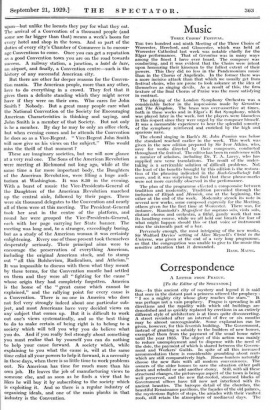Music
THREE CHOIRS' FESTIVAL.
TuE two hundred and ninth Meeting of the Three Choirs of Worcester, Hereford, and Gloucester, which was held at Worcester Cathedral last week was notable chiefly for the Eiger performances. That of Gerontius was in many ways among the finest I have ever heard. The composer was conducting, and it was evident that the Choirs were intent upon honouring their kinsman to the fullest extent of their powers. This they did no less in the Pandemonium music than in the Chorus of Angelica's. In the former there was a more incisive attack than that which we usually get from festival choirs, who are prone to look askance at the idea of themselves as singing devils. As a result of this, the firm texture of the final Chorus of Praise was the more satisfying in contrast.
The playing of the London Symphony Orchestra was a considerable factor in the impressions made by Gerontius and The Kingdom. The brass was over-assertive at times, both in these works and in Elgais E flat Symphony, which was played later in the week, but the players were blameless in this respect since they were urged by the composer himself. It was a memorable experience to hear the splendid sonority of the symphony reinforced and enriched by the high and spacious nave.
The choral singing in Bach's St. John Passion was below the standard reached earlier in the week. This work was given in the new edition prepared by Sir Ivor Atkins, who, save for works directed by their composers, conducted throughout the festival. The editor has been in conference with a number of scholars, including Dr. T. A. Lacey, who has supplied new verse translations. The result of the under- taking is a serviceable solution of difficult problems. Not the least of the benefits brought by this edition is the restora- tion of the phrasing indicated in the Bach-Gcsellsehaft full score, and it was surprising to find that these phrase-marks were not more carefully observed in the performance.
The plan of the programme effected a compromise between tradition and modernity. Tradition prevailed through the inclusion of Elijah and Messiah, one at the beginning, the other at the end of the week. Modernity struck its note in several new works, some composed expressly for the Meeting, others given for the first time at Worcester. There was, for instance, Kaminski's Magnificat for soprano solo, viola solo, distant chorus and orchestra, a fitful, gaudy work that ran its headlong course, while we all held our breath for fear of what might happen should this or that voice or instrument miss the sixteenth part of a bar.
Perversely enough, the most intriguing of the new works, Sir Walford Davies' setting of Alice Meynell's Christ in the Universe, was given at the end of a very long programme, so that the congregation was unable to give to the music the sensitive attention that it demanded.
BASIL MAINE,












































 Previous page
Previous page